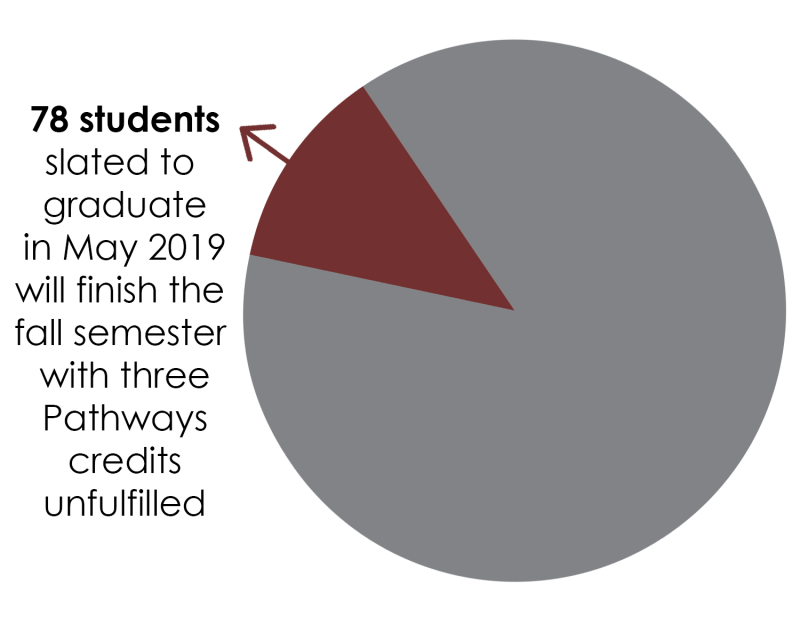The most recent figures show that 78 students with an expected graduation date of May 2019 are anticipated to be incomplete in three or more Pathways components at the end of the fall semester. The data does not include changes students made to class schedules during the add/drop period, certain transfer credits, pending waivers, course substitutions or exceptions.
The class of 2019 will be the first class to graduate from Trinity under the Pathways curriculum, which was implemented in 2015. The number of students with missing requirements is expected to decrease. However, the curriculum has caused some concerns for seniors.
“We want this class to be successful and we know that Pathways is new and anytime you try something new you have to be wiling to see how it goes and make adjustments,” said Glenn Kroeger, chair of the University Curriculum Council (UCC). “What we’re trying to do is figure out if there are some that are more problematic than others. And there are, they’re not even.”
Kroeger expressed the most concern about the interdisciplinary cluster element of the curriculum. The cluster requires taking three classes in three different disciplines that are connected by a specified theme. Currently, there are 18 different clusters, but this number has grown substantially since when the class of 2019 started at Trinity.
“Part of the reason for that is that for the past three years clusters have been growing, more courses have been added, but that also means that it’s taken longer for seniors to find those courses available,” Kroeger said. “Very often, a student will have in their mind ‘This is the one course I want to take to finish some requirement.’ Well it’s fine to hold out for that one course, but in the end you may have to choose a different one.”
Duane Coltharp, associate vice president for Academic Affairs, elaborated on the reasons he thinks the clusters have been a more of a problem.
“Because it’s a three-course requirement, it’s a bigger commitment than other elements,” Coltharp said. “I have the sense that some students took a while to make the commitment and decide which cluster they were actually going to work on. Some clusters are bigger than others and some of the smaller clusters don’t have a lot of registration options in a given semester.”
Ana White, senior, reflected on some of the most difficult things about the Pathways curriculum.
“Pathways made it much more difficult to double major unless the two majors have common classes,” White wrote in an email. “Originally, I planned to double major in music education and math. I dropped math because to double major on Pathways I would have had to take more than 20 hours each semester. As it is, I’ve taken 17-19 hours — usually 19 — each semester.”
White also expressed that the cluster was particularly difficult.
“For the music [education] major, we have to take two classes in the same cluster, but they’re both in the same department so only one is allowed to count,” White wrote. “The cluster also only allows us to use one class required for our major. I know a lot of other people in different majors have also struggled with the cluster component and have had to get exceptions made so they can graduate. Our professors in the department are working to resolve the cluster issue so we can graduate. I’ve finished everything else for Pathways.”
The UCC and Academic Affairs are both working to improve the Pathways curriculum and to help students complete the curriculum.
“The UCC will be working constantly to get input to figure out what’s working, what’s not, to make adjustments,” Kroeger said. “The goal is to graduate students.”
For students facing issues with the interdisciplinary cluster, there are options available such as the student-designed cluster.
“I’m not sure if all students know about that, but that is an option,” Coltharp said. “That requires a form, a proposal, it takes some work, so it’s not for everyone. But it is possible for a student to identify three courses that have some common theme and then to make a case for the coherence of those courses and that would ultimately have to be approved by the UCC. We had a few last year, five or six were approved. I would expect to see more this year.”
Another option is working with Michael Soto, vice president for Academic Affairs, who can evaluate courses that are not listed as Pathways, but could apply to the curriculum.
“He grants exceptions to curricular policy for all kinds of reasons, not just having to do with the cluster,” Coltharp said. “We don’t want to see too many of those, but when for whatever reason a student is having difficulty actually fulfilling the curricular requirements, we can — if it’s justified — make course substitutions.”
The Pathways curriculum will continue to be evaluated by the UCC, and changes will be made if necessary.













